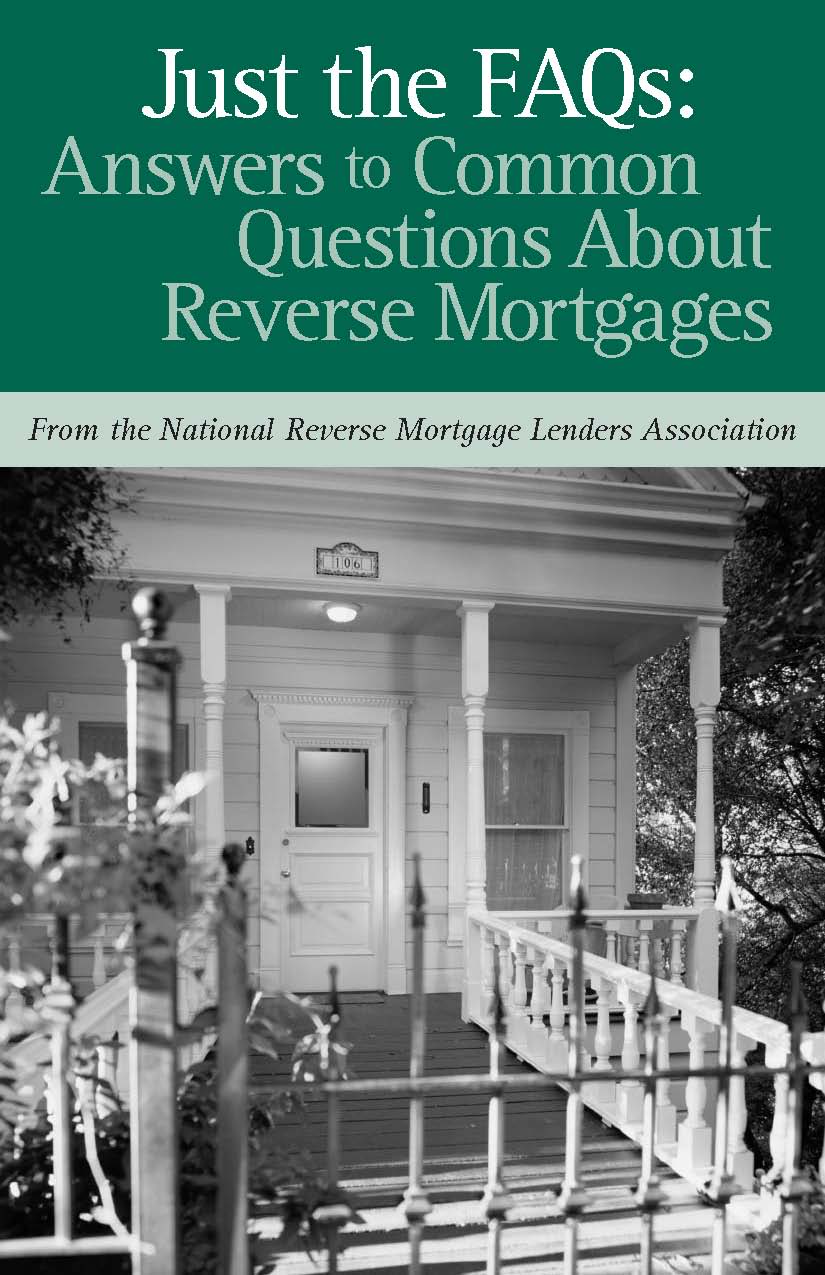
THE NATIONAL REVERSE MORTGAGE LENDERS ASSOCIATION
The National Reverse Mortgage Lenders Association is a nonprofit trade association, based in Washington, DC, whose mission is to support the continued evolution of reverse mortgages as an important financial option for senior homeowners while educating consumers and lenders about the varied applications of this type of loan. Members sign a Code of Conduct pledging to abide by guidelines that assure fair, ethical, and respectful practices in offering and making reverse mortgages to seniors. Details on NRMLA and reverse mortgages and a state-by-state list of reverse mortgage lenders may be found on NRMLA's Web site at http://www.reversemortgage.org .
Just the FAQs:
Answers to Common Questions About Reverse Mortgages
Introduction
As more people learn about the versatility of reverse mortgages, this financial planning tool has gained significant popularity. Today, record numbers of consumers are using reverse mortgages to remain in their homes to supplement their retirement income, pay for health care expenses, make home modifications, or simply establish a cash reserve for emergencies.
Despite increased popularity, even some of the most basic facts about reverse mortgages are often misunderstood. According to Peter Bell, President of the National Reverse Mortgage Lenders Association, a relatively short industry history and rapid product evolution have deluged consumers with information that at times is confusing or inaccurate.
The most common misconception we hear is, "A reverse mortgage is where the bank gives you some money and then takes your house," says Bell. That couldn't be further from the truth. Our mission, Bell explains, is to inform seniors about the benefits of reverse mortgages so they can make informed decisions about whether this product makes sense for their own particular situation.
This guide provides answers to the most common questions asked by consumers. The questions are broken into three categories: those appropriate to ask before getting a reverse mortgage; those applicable after getting a reverse mortgage; and those applicable when a reverse mortgage needs to be repaid.
Other guides published by NRMLA include Using Reverse Mortgages for Health Care: A NRMLA Guide for Consumers and the NRMLA Guide to Aging in Place. Both may be viewed on our Web site (http://www.reversemortgage.org) along with detailed information about different reverse mortgage products and a state-by-state listing of reverse mortgage lenders.
A reverse mortgage is a loan that enables older homeowners (62 or older) to convert part of the equity in their homes into tax-free income without having to sell the home, give up title, or take on a new monthly mortgage payment.
Misconception # 1
REVERSE MORTGAGES ARE ONLY FOR DESPERATE SENIORS, OR FOR THE "HOUSE RICH, CASH POOR."
INCORRECT.
The reverse mortgage is a n excellent financial plannin g tool that is used b y homeowners from all walk s of life to enhance thei r retirement years . While some have neede d a reverse mortgage mor e than others, the growin g popularity of this product i s evidence of its benefit in a wide array of financia l circumstances .
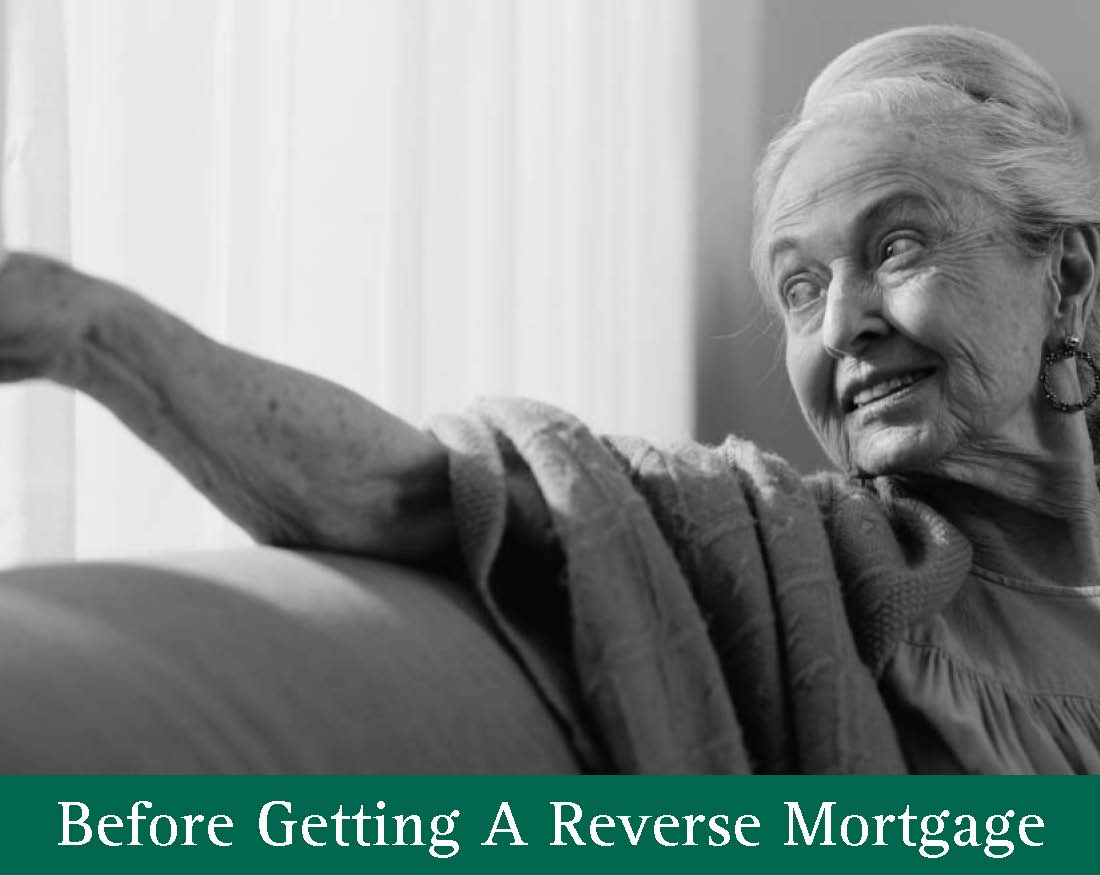
Am I eligible for a reverse mortgage ?
To qualify for a reverse mortgage, you must:
1 If one spouse or co-owner is under 62, that person's name must be removed from the title so that the other person can qualify for the reverse mortgage.
How much mone y can I get ?
This depends on a few factors, including your age, the value of your home, the amount of built-up home equity, and interest rates at
the time of origination. Other factors are the type of reverse mortgage product and particular payment option you select. A calculator that can help estimate how much you could receive under different products and payment options is available at NRMLA's web site (http://www.reversemortgage.org), and from most reverse mortgage lenders and counselors.
What are m y payment options ?
Misconception # 2
YOUR HOME MUST B E DEBT-FREE TO QUALIFY FO R A REVERSE MORTGAGE .
INCORRECT.
Even seniors with a n outstanding first mortgag e or other debt on thei r home may qualify fo r a reverse mortgage . The proceeds of the revers e mortgage, though, mus t first be used to pay of f such debts .
You decide how to receive the money generated by a reverse mortgage. Your payment options are:
How much does a reverse mortgage cost ? What are the upfront and closing fees ?
Many of the same costs associated with a regular mortgage apply to reverse mortgages. You will be charged an origination fee, a mortgage insurance premium (for FHA Home Equity Conversion Mortgages), an appraisal fee, and certain other standard closing costs. In most cases these fees and costs are capped and may be financed as part of the reverse mortgage, so that you incur little out-of-pocket expense.
Do I need to get an appraisal of my hom e to get a reverse mortgage ?
Yes. Since the value of your home is a factor in determines how much money you can get from a reverse mortgage, an appraisal is required. Normally the lender will order the appraisal, which is paid for by the borrower at the time of application.
Do I need a lawyer to apply fo r a reverse mortgage ?
Legal counsel is not required. However, NRMLA encourages you to seek the advice of a legal, tax, or financial advisor before committing to a reverse mortgage.
Consumer Safeguards
Misconception # 3
Am I required to receive counseling before I get a reverse mortgage?
THE BANK OWNS THE HOME AFTER YOU GET A
REVERSE MORTGAGE.
Yes. Counseling is required for all three reverse mortgage products currently available in the marketplace. The counselor's job is to make sure you are informed about reverse mortgages and other options. You can get the name of a local counseling agency or qualified telephone counselor from a reverse mortgage lender or by calling the National Foundation for Credit Counseling (866-698-6322), Money Management International (877-908-2227), AARP (800-209-8085), or HUD's Housing Counseling Clearinghouse (800-569-4287).
Are reverse mortgage proceeds taxable income, and can they affect my Social Security or government benefits?
Funds from a reverse mortgage are tax-free; it's your money, not additional income. A reverse mortgage does not affect regular Social Security or Medicare benefits. However, if you receive a lump sum payment from a reverse mortgage, any amount retained the month after you get it would count as a resource and could affect Medicaid eligibility. To be safe, consult a reverse mortgage lender, or a Medicaid expert.
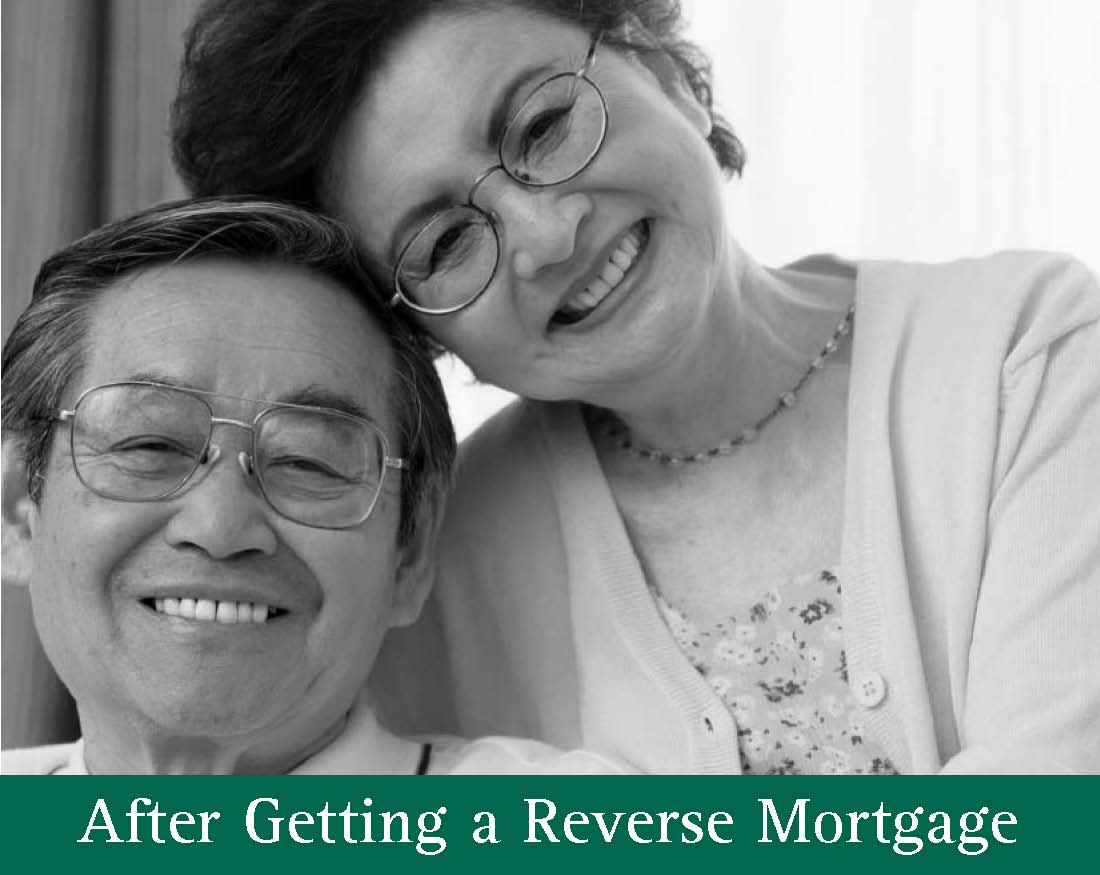
Who owns title to my home while my revers e mortgage is outstanding - the bank or me?
You retain title to your home during the period when you have a reverse mortgage, just the same as with a regular home purchase mortgage.
Am I required to pay anything during the course of the reverse mortgage loan?
No. The flow of payments is reversed during the term of the reverse mortgage - the lender pays you. However, you are responsible for keeping up payments on your homeowner's insurance and property taxes, and to maintain the condition of your home.
Misconception # 4
WHEN A REVERSE MORTGAGE COMES DUE, THE BANK SELLS THE HOME.
INCORRECT.
When the loan must be repaid, you or your heirs can either pay the balance due on the reverse mortgage and keep the home, or sell the home and use the proceeds to pay off the reverse mortgage.
Are there any limits on how I can use the funds from a reverse mortgage?
No. Borrowers have used reverse mortgages for a variety of purposes, such as paying health care expenses, supplementing retirement income, financing home repairs or modifications, or visiting friends and family. Some have used a reverse mortgage to purchase recreational vehicles, start a small business, and travel. Others have used reverse mortgages to eliminate expenses by paying off mortgages and credit card debt. The only limit on how you use a reverse mortgage is your imagination.
What is the interest rate on a reverse mortgage and how is it determined?
The interest rate varies by type of reverse mortgage.
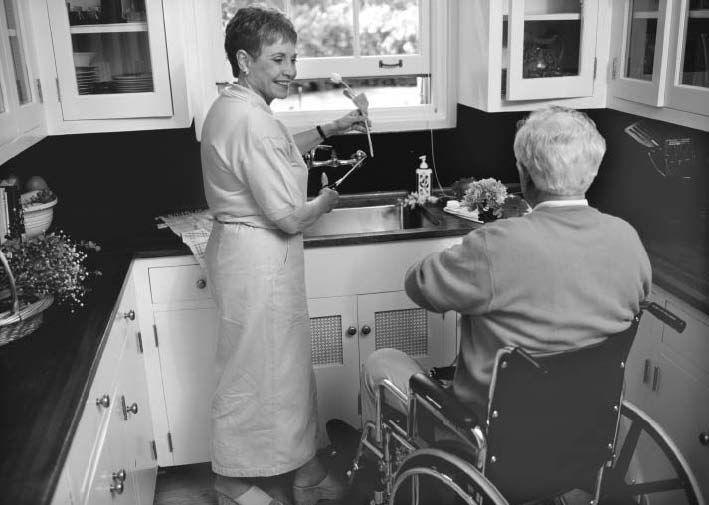
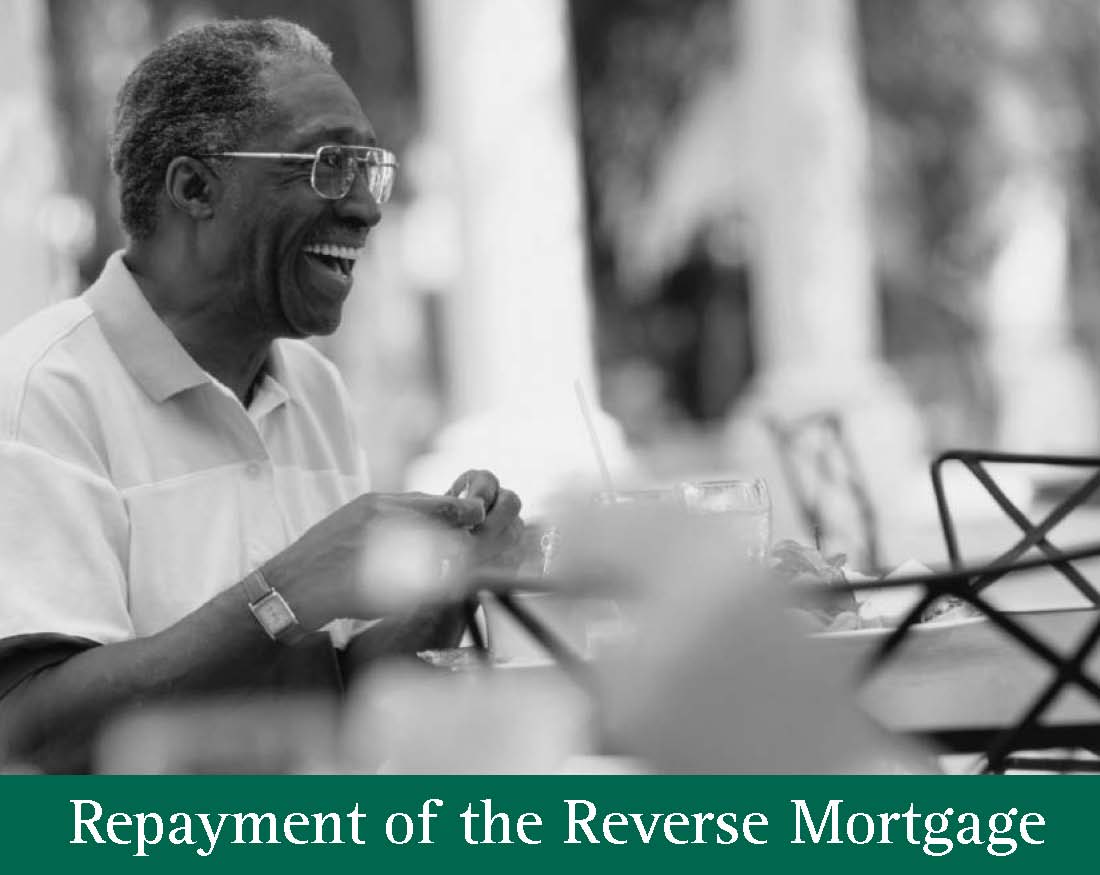
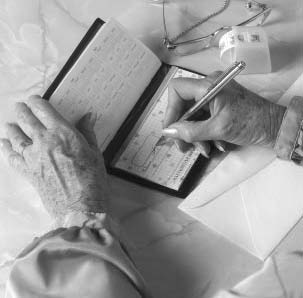
How much will be owed when my reverse mortgage comes due?
The amount owed to the lender typically includes the amount
borrowed to date, the amount of accrued interest, accrued mortgage insurance premiums (for the HECM), servicing fees, and any other costs and fees financed as part of the loan amount. In no event will the repayment amount exceed the value of the home at the time the loan comes due. There are no pre payment penalties for the current reverse mortgage products.

What happens if I move out of my house after I get a reverse mortgage?
You may live outside your home for up to 12 consecutive months before the loan must be repaid. In general, a reverse mortgage comes due when the borrower dies, permanently moves out, or sells the home.
What happens when my house gets passed to my heirs?
Once your home is passed to your heirs, the reverse mortgage comes due. Your heirs may either pay the balance due on the reverse mortgage and keep the home, or sell the home and use the proceeds to pay off the reverse mortgage. If they sell the home, they get to keep any excess sales proceeds.
And most important - Where can I get a reverse mortgage?
Reverse mortgages are offered mostly by private, specialized lenders. For a list of lenders who belong to NRMLA who offer reverse mortgages in your state, visit NRMLA's Web site, http://www.reversemortgage.org (Click on Locate a Lender), or call NRMLA, 1-866-264-4466. Note: All members of NRMLA agree to the organization's Code of Conduct - so you can be confident that NRMLA members will treat you fairly and respectfully.
Senior Citizen Reverse Mortgage | Southern California Reverse Mortgages | Home Equity Conversion Mortgage | National Reverse Mortgage Lenders | LA Reverse Mortgage | Los Angeles Reverse Mortgage | Reverse Mortgage Los Angeles | California Reverse Mortgage Lenders | CA Reverse Mortgage | Senior Reverse Mortgage | California Reverse Mortgage | Reverse Mortgage California | Reverse Mortgages In California | Reverse Mortgages For Seniors | Home Equity Loan California | Home Equity Loans California | Reverse Mortgage Loan |
 | © Copyright 2026 Nationwide Reverse Mortgage.com | 22837 Ventura Blvd., Suite 203 Woodland Hills, CA 91364 (877) 777-9922 |

© Copyright 2026 Nationwide Reverse Mortgage.com
22837 Ventura Blvd., Suite 203
Woodland Hills, CA 91364
(877) 777-9922



